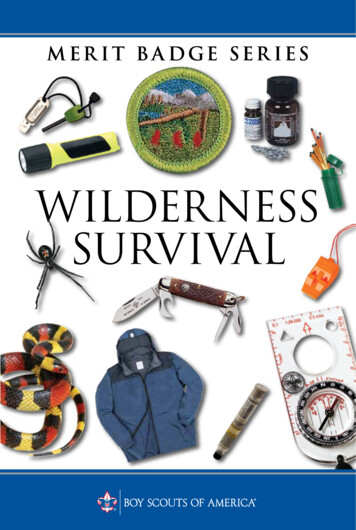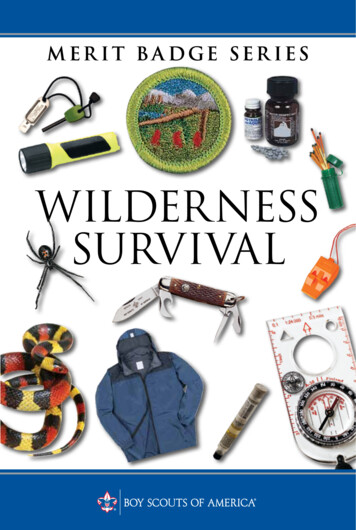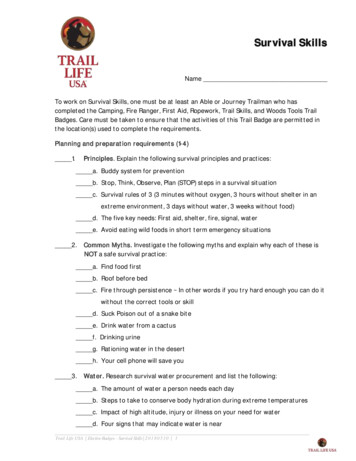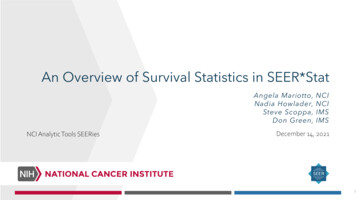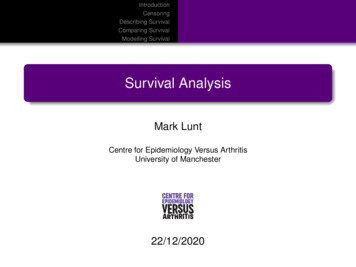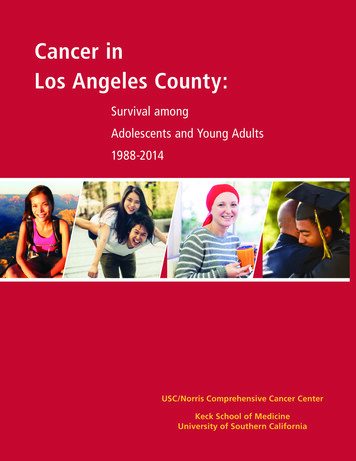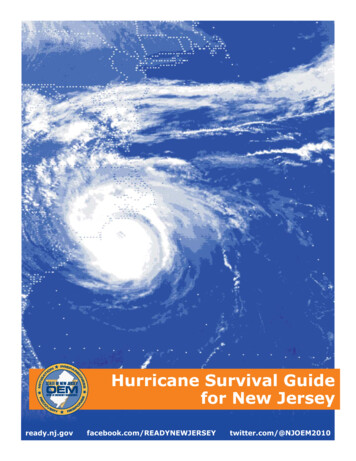
Transcription
1921ready.nj.govHurricane Survival Guidefor New M2010
Time to Get Ready.Hazardous weather impacts New Jersey residents on a regular basis. Manyof us have experienced the long-term power outages, flooding, evacuations, property destruction, debris and other impacts to our daily lives thatcan result from the onset of nature’s fury. We can’t stop the onset of a natural hazard;but there are steps you can take to increase your safety and comfort when adverseconditions occur.We encourage you to read through this “Hurricane Survival Guide for New Jersey,”and take the actions necessary to secure your family and home. The preparations youmake for hurricanes will also help you survive all types of natural disasters.The first step is to stay informed, via traditional or social media. The second step is todiscuss hurricanes and other natural hazards with family members and determine waysto stay close and connected regarding your evacuation plans and locations. Considerthose in your family or community who might need extra assistance, due to age ordisability, regarding emergency plans. Don’t forget your pets! The third step involvesgathering emergency supplies; many of these items can be found around your home.Get ready now, be an example for others, share this information with those who needit. And thank you for being part of a more prepared New Jersey.THE NEW JERSEY OFFICE OF EMERGENCY MANAGEMENTTropical Storm WatchHurricane WatchA tropical storm watch is issued whentropical storm conditions, includingwinds from 39 to 73 mph, pose apossible threat to a specified areawithin 48 hours.A hurricane watch is issued fora specified area when hurricaneconditions, including sustained windsof 74 mph or greater, are possiblewithin 48 hours.Tropical Storm WarningHurricane WarningA tropical storm warning is issuedwhen tropical storm conditions areexpected to affect a specified areawithin 36 hours.A hurricane warning is issued for aspecified area when hurricane conditions are expected within 36 hours. Incoastal or near-coastal areas, a hurricane warning can remain in effectwhen dangerously high water and exceptionally high waves continue eventhough the winds may have subsidedbelow hurricane intensity.The Atlantic hurricane season lasts from June 1 toNovember 30. New Jersey’s tropical storm activity istypically between August and late October.NJ Hurricane Survival Guide
STEP 1:StayInformedOn The Web: Use credible websites to get information about natural hazards andemergency preparedness. The NJOEM works closely with the National Weather Service and the National Hurricane Center regarding storm predictions and forecasts.National Weather Service - http://www.erh.noaa.gov/er/phi/National Hurricane Center - http://www.nhc.noaa.gov/N.J. Office of Emergency Management - www.ready.nj.govNJ 2-1-1 - NJ Residents can dial 2-1-1, toll-free, for preparedness anddisaster-related info 24/7 or www.nj211.orgAmerican Red Cross - http://www.redcross.org/Scan forNJOEM onFacebookFederal Emergency Management Agency – www.ready.govSocial Media: Social media and other advanced communicationstechnologies are used frequently by emergency managers statewide.Find out if your community has a “reverse 9-1-1” system or if youcan opt-in for email updates from municipal officials. “Like” NJOEM onFacebook: http://www.facebook.com/READYNEWJERSEY.Follow us on Twitter: @NJOEM2010.Scan forNJOEM onTwitterNJ Alert: A free, voluntary, and confidential emergency alerting system that allowsthe New Jersey Office of Emergency Management officials to send email or textmessages to cell phones and other email during an emergency event. Sign up forNJ Alert by logging on to: www.njalert.gov.Nixle: An application that allows verified government agencies to communicatewith the public via text/SMS, email, and internet posts. This service is provided atno cost to the department, taxpayers, or residents. Unlike other social media applications, Nixle does not contain any third-party advertisements. New Jersey residents can register to receive messages by sending a text message with their zipcode to 888777 (data rates may apply depending on your plan). Online registrationis also available at: www.nixle.com.NOAA Weather Radio: A nationwide network of radio stations broadcastingcontinuous weather information directly from the nearest National Weather Service office. They broadcast warnings, watches, forecasts, and otherhazard information 24 hours a day, 7 days a week. NOAA weather radiosare typically inexpensive, readily available in stores, and can often be programmed for your specific area.www.ready.nj.gov1
STEP 2:Make a PlanDDDDDGet together with your family and create a communications plan ahead oftime. This will help you and your family to connect as quickly and easily aspossible after the storm.Keep a written record of all important phone numbers.Designate an individual outside of the state to serve as a family point of contact. (After a disaster it is often easier to call out-of-state than within the affected area.)Make sure that all family members know who this person is and how to contact them.After a disaster or evacuation, all family members should make contact withthe designated individual. Try choosing a certain time for everyone tocheck in.Our Family Communications PlanSetting up a Family Communications Plan ahead of time will make sure youand your family can connect as easily and quickly as possible.2NJ Hurricane Survival Guide
STEP 3:Build a Hurricane KitUse these suggestions as a guide for gathering your hurricanesupplies. Remember these critical points: Stock a 2 week supply of these emergency necessities. Store clean-up and repair supplies in a safe place. Make your hurricane kit portable in case you need to evacuate. Don’t forget special supplies for babies, the elderly, and those with access orfunctional needs. Review homeowner’s or renter’s insurance plan as it relates to natural disasters.the basics.Alarm clock (battery operated)Eating & cooking utensilsBattery or crank-operated radio/TVEmergency cooking facilities (grill/camp stove)NOAA All-Hazards radio}CAUTION: Storeproperly in approvedcontainers.Flashlights (one per person)Gas for the grillBatteries for radio/flashlights tolast several daysCans, gas & oilButane lighterFire extinguisherWork boots/shoesFirst aid kit & manualChange of clothesCash, credit cardsSleeping bags, sheets & towelsDriver’s licenseBlankets & pillowsCellular phones & chargersBleach without scents/additives (ina secure, well-marked container)Important phone numbersPrescriptions, including eyeglassesWater, 1 gallon per person per dayWater purification tabletsCoolers for food & waterCanned & dried foodNon-electric can openerPots & panswww.ready.nj.govSoap, shampoo & toiletriesSponges/paper towelsToilet paper & towelettesFeminine hygiene productsBaby food, diapers & formulaToys (to occupy children)Pet food63
important papers.Social security cardsStocks & bondsBirth certificatesInventory of household goodsMarriage & death recordsComputer file backupsWillsPictures (both personal & ofbelongings)Insurance policiesDeeds & mortgagesSavings & checking bookscleanup & repair supplies.Axes, hammers & hatchetsExtension cordsBars, wrecking & crowGeneratorsBroomsHeavy plastic tarpsCamera to record damageInflatable raftChain, steelLaddersChain saw & fuelsLanterns & fuelCaulk & caulking gunLumberCleaning suppliesMosquito repellentDuct & masking tapePlastic trash bagsDrills & bitsNails, screw, bolts*Store your kit in a convenient place known to all family members.Keep a smaller version of the supply kit in the trunk of your car.Change your stored water supply every six months so it stays fresh.Replace batteries, update clothes.4NJ Hurricane Survival Guide
bermemeRoTspImportant Ti!evacuate, GOtoldtoourea If youat ALL times. Yuoyhitwronoes oou have your shyresuekaM .vacuate quicklymay need to ethe ATMs andreasot,uoispowern hand. If theoshcaevaH chines.credit card mapumps will notsagehT.rms.f the stoopen afterwardtor cars ahead oudoeygapumasdaoG e toower or may brwork without phave access oohwrsobhigeand neck on friendschtoresueB ds.functional neekeep them in adnadnahnoicationsave extra medhtoresueB t container.OW.water resistaners together Npapcenrasuds and inu can, scan anur vital recordoyoyIffor.ellainttaenG nt cobersa water resistaimportant numfoypcoaeKeep them invu hayourself so yoemail them totc.werand policies, ethem if the poseutotonytrts andcall, so use texour cell phoneyllpceuaenrgaahthCre owng uses less pgoes out. Textisave power.toleibssopnemessaging wher you are thethehW.wonsplanuedness continuityplan for continsieubmassgrcuuisoDy ssto a boss, discuboss or reporttions.business operas, crawlspaces,egraags,emoside hdoorsa generator inns or openingfagnsiuneh NEVER usewoxidear areas, evenof carbon monlsevlelysheds, or simildaer hours, evenventilation. Dforrefogsnliwondcaindwandas anup in these aredilublykicuqcanff.tor has shut oraeneger)threafts, electric, watea(gselvavffotyour utility shu Know whereuse them.are and how towww.ready.nj.gov5
People with Access &Functional NeedsEach person’s needs and abilities areunique, but every individual can takeimportant steps to prepare for all kindsof emergencies and put plans in place.By evaluating your own personal needsand making an emergency plan, you canbe better prepared for any situation. Consider how a disaster might affectyour individual needs. Plan to make it on your own, at leastfor a period of time. It’s possible thatyou will not have access to a medicalfacility or even a drugstore.Who are Individuals with Access &Functional Needs? Those who are deaf or hard of hearing may need to make special arrangements to receive emergency warnings. Single working parents and those withlimited English proficiency may needhelp planning for disasters and emergencies. Community, faith-based, andcultural groups may be able to helpkeep people informed. People without vehicles may need toarrange for transportation.People with special dietary needs shouldtake precautions to have an adequateemergency food supply. Identify what kind of resources you useon a daily basis and what you might do Additional Supportif they are limited or not available.The Dept. of Human Services Division Build a kit with your unique consider- of Mental Health and Addictions Servication in mind. What do you need to es Office of Disaster and Terrorism:maintain your health, safety, and inde- 1-877-294-HELP (1-877-294-4357)pendence?1-877-294-4356 TTY (voice callers useIf you or someone close to you has a dis- 7-1-1 NJ Relay)ability or other access or functional need, Addictions Hotline of NJ:1-800-238-2333you may have to take additional steps to NJ SNAP/Food Stamps: 1-800-687protect yourself and your family.9512 or visit http://www.nj.gov/Find out about individual assistance that humanservices/dfd/programs/njsnap/may be available in your community. Medicaid Call Center: 1-800-356-1561Register in advance with the office of Work First NJ/General Assistance:emergency services, the local fire depart- 1-800-792-9773 or visit http://ment, and other government agencies or www.state.nj.us/humanservices/dfd/non-profit groups. Tell them of your indi- programs/workfirstnj/vidual needsor those of afamily member and findout what assistance orservices canbe provided.6NJ Hurricane Survival Guide
Travel Trailer/Mobile Home SafetyNO TRAVEL TRAILER OR MOBILE HOME – NO MATTERHOW NEW IT IS – CAN BE A SAFE SHELTER FROMSTORM FORCE WINDS.IF COUNTY OR STATE OFFICIALS TELL YOU TO EVACUATE: LEAVE AS SOON AS POSSIBLE. Make a Family Communication Plan. Tell someone outside of the storm areawhere you are going. Take emergency supplies, warm protective clothing, and blankets/sleepingbags to shelter. Protect your home by unplugging appliances and turning off electricity and water. Turn off the main electrical power switch. Turn off the main water valve and disconnect the hose. Turn propane tanks off. Lock up your travel or mobile home and leave.DURING A HURRICANE OR TROPICAL STORM WATCH OR WARNING: Listen to radio/television for storm progress reports. Check emergency supplies. Fuel your car. Board up windows and check tie-downs on your travel trailer or mobile home. Turn refrigerator and freezer to coldest settings. Store drinking water. Review evacuation plan.AFTER THE STORM Stay tuned to local radio or television for information from your local or stateofficials. Return home only after state or local officials advise that it is safe to do so.!!Any individual who lives in a travel trailer should pay close attentionto radio and television reports to receive important information fromlocal and state officials concerning hurricane precautions.www.ready.nj.gov7
Plain Talk On Protecting PetsNatural disasters, such as flash floods, hurricanes, or forest fires, and man-madeproblems such as gas explosions, leaking tank cars, and terrorist incidents, canarrive with little, if any, warning. The type of disaster will determine whether toshelter in place or evacuate the area. Your county/local emergency managementcoordinator will have the most current updates and recommendations at the timeof the disaster. This number can be found in the blue pages of your telephonebook. By developing a disaster action plan for yourselves and your pets, you canimprove the chances that all of you can make it through a disaster safely.If you are ever instructed to evacuate, please remember your pets!Take Steps to Protect Your PetsHave a safe place to take your pets. Do thisresearch ahead of time, before a disaster strikes.Prepare a list of emergency phone numbers, andkeep it handy. If your pet has any special needs,such as a special diet or medication, or is an exotic pet (including reptiles, birds, and fish), consider their requirements in your disaster planningbefore you need to evacuate these animals.Get a portable pet carrier foreach pet. These carriers shouldbe large enough for the pet tostand up and turn around in.Get your pet used to the carrierahead of time. Snakes may bekept in plastic containers, andbirds need their cages.Ask a dependable friend or relative who livessome distance away if you and/or your pets canstay with them during an emergency.Have identification for eachpet. Be sure your pet ALWAYSwears a well-fitted collar withproper identification, and hasbeen micro-chipped or tattooed.ID tags and pet carriers shouldinclude your phone number(s)as well as the number of acontact outside the affectedregion.Contact hotels and motels outside your immediate area to check policies on accepting petsduring times of emergencies and any restrictionsthey may have.Make arrangements with trustworthy neighbors for pet care if a disaster strikes and youcannot get home in time to evacuate.Find boarding kennels within and outside yourarea. Know where they are, who stays on thepremises with the animals in the event of a disaster, and what provisions would be made if thekennel should have to evacuate during a disaster.Listen for public service announcements during a disaster that may instruct you to take yourpets to a temporary emergency animal shelter.For these places, you must do the following:8NJ Hurricane Survival Guide
Prepare a Disaster Travel Kit For Your PetIn case you must leave the area withyour pet, this kit should include:Copies of pet license, microchip,tattoo and/or ID, photos of pet(from all angles and with owner(s)),and plastic bag with proof ofvaccination.Proper size metal or plastic petcarrierLeashes and obedience aidsNon-spill water and food bowlsPet foods, including special dietsWater in sanitized non-breakablecontainersMotion sickness pills prescribed byyour veterinarian, if neededSpecial medications, withinstructionsSpecial needs items for exotic pets,such as a heat sourceNewspapers, paper towels, handywipes, can openers, a flashlight,and blanketsWhat to do when the “All Clear”sounds:Once the all clear has sounded and youand your pets return to your home, becareful about allowing your pets outdoors unattended and off leash. The disaster may have altered familiar scentsand landmarks and your pet could easily get confused and become lost.www.ready.nj.govIn addition, sharp objects, downed electric lines, fallen trees and other debris,or contaminated water could present real danger to your pet. Raccoons,skunks or other wild animals may haveentered the area and could potentiallybe a danger to your pets.If any animals are lost during the disaster, contact veterinarians, humane societies, pet shelters, and other facilitiesthat might house animals. Be preparedto identify and document ownershipwhen claiming lost livestock. The UnitedStates Department of Agriculture Missing Pet Network at www.missingpet.netmay be of assistance.If you own horses, livestock, or poultry,you need to develop emergencyevacuation plans for them also. Seethe “Plain Talk on Protecting Livestock”guide, available at og/emergency preparedness.html, yourcounty emergency managementcoordinator’s office, or from the NewJersey Department of Agriculture at609-292-3965.For More sions/ah/prog/emergencypreparedness.htmlNew Jersey Department of Agriculture:www.NJ.gov/agricultureNew Jersey Domestic SecurityPreparedness Task sptf.htmlHumane Society of the United States:www.hsus.org/disasterNew Jersey Veterinary MedicalAssociation: www.njvma.org9
Hurricane Hazards.High WindsHurricane-force winds can easilydestroy poorly constructed buildingsand mobile homes. Debris such assigns, roofing material, and small itemsleft outside become flying missiles inhurricanes. Extensive damage to trees,towers, water and underground utilitylines (from uprooted trees), and fallenpoles cause considerable disruption.The eye wall and innermost rain bandsof hurricanes are extremely dangerousin that they can produce very localizeddevastation. The strongest winds aretypically associated with the eye wall ofa hurricane. When winds of 111 mph(category three) or more are expectedin an area, an extreme wind warningwill be issued by the National Weather Service.Graphic courtesy of NOAAThe strongest winds usually occur on the right side of the eye wall of thehurricane. This can be seen in the wind analysis above from Hurricane Irene in2011.Wind damage increases dramatically as a storm grows stronger. A category fourhurricane with winds 131 to 155 mph, would be expected to cause 100 times thedamage of a category one storm.Locations wellinland can stillexperiencedestructive winddamage. Windgusts can actuallyincrease inlanddue to turbulencemixing fastermoving air to thesurface.10NJ Hurricane Survival Guide
Hurricane Hazards.Storm SurgeStorm surge is a dome of water often50 to 100 miles wide that sweeps acrossthe coastline along and to the right ofwhere the eye makes landfall. In general,the stronger the winds, the higher thestorm surge. If the hurricane makes landfall during high tide, the impact is evengreater.Storm surge does not take into accountwave height, which is added on the top ofthe storm surge, to produce even moredestruction. The size, speed, and strengthof a storm and the angle it approachesthe coast contribute to the damage stormsurge can cause.www.ready.nj.govGraphiccourtesy ofNOAA11
Hurricane Hazards.FloodingA FLASH FLOOD occurs within a few hours (usuallyless than 6 hours) of heavy or excessive rainfall, adam or levee failure, or the sudden release of water.A FLOOD develops more slowly, normally takingmore than 6 hours.Many flash flood fatalities occur at night.SIX INCHES of fast-moving water can knock you off your feet.TWO FEET of rushing water can carry away most vehicles, including SUVs andpickups.Floods are long-term events and may last days, weeks, or even longer! The National Weather issues flood watches well ahead of expected arrival. This is thetime to make preparations, including planning an escape route if you live in aflood-prone area.Flash flood warnings and area-based flood warnings are issued as tropical systems make landfall. Area-based flood warnings may continue for days or weeksuntil flood waters have receded.Most flooding deaths occur in automobiles. Always avoid drivinginto flooded areas! Remember to “Turn Around, Don’t Drown.”12NJ Hurricane Survival Guide
Hurricane Hazards.TornadoesHurricanes can produce tornadoes as theymove onto land. These tornadoes add to ahurricane’s destructive power. The NationalWeather Service will issue tornado warningswhen they are spotted on Doppler radar orreported.Most tornadoes associated with hurricanesare less intense than those that occur inthe plains, typically EF0 to EF1 on thenew Enhanced Fujita Scale. However, theeffects of tornadoes added to the largerarea of hurricane-force winds can producesubstantial damage.ENHANCED FUJITA SCALE: TheNational Weather Service (NWS) usesthe EF-Scale to assign a tornado arating based on estimated wind speedsand related damage.www.ready.nj.govEF Rating3 Second WindGust (MPH)065 - 85186 - 1102111 - 1353136 - 1654166-2005Over 20013
Hurricane Hazards.Rip CurrentsUnlike most hazardsassociated withhurricanes, rip currentsdiffer in that they can bea threat days in advanceof a hurricane, andcause deaths even whenthere is no threat of ahurricane strike in ourarea.Rip currents are powerful,channeled currents of waterflowing away from theshore. A Rip current is oftennot seen by a swimmerbefore being caught in itsgrip. They can be presenton what appears to be aperfect day at the beachwith bright sunny skies andno hint of danger.Although a variety of factorscan cause rip currents,hurricanes produce themdue to a powerful oceanswell wave that their strongwinds generate. The swellwave radiates outward fromthe center of the stormand can affect beachesthousands of miles away.Graphic courtesy of NOAARip current safety signs are placed along areabeaches. For more information on rip currents, visitwww.ripcurrents.noaa.gov14NJ Hurricane Survival Guide
After a Hurricane. Continue listening to a NOAA weather radio or the local news for the latestupdates. Stay alert for extended rainfall and subsequent flooding even after thehurricane or tropical storm has ended. If you have become separated from your family, use your familycommunications plan or contact FEMA or the American Red Cross.FEMA has established the National Emergency Family Registry and LocatorSystem (NEFRLS) which has been developed to help reunite families whoare separated during a disaster. The NEFRLS system will enable displacedindividuals the ability to enter personal information into a website database sothat they can be located by others during a disaster.The American Red Cross also maintains a database to help you find family.Contact the local American Red Cross chapter where you are staying forinformation. Do not contact the chapter in the disaster area. If you evacuated, return home only when officials say it is safe. If you cannot return home and have immediate housing needs, text SHELTER your ZIP code to 43362 (4FEMA) to find the nearest shelter in your area(example: shelter 12345). For those who have longer-term housing needs, FEMA offers several types ofassistance, including services and grants to help people repair their homes andfind replacement housing. Apply for assistance or search for information abouthousing rental resources at www.fema.gov.15www.ready.nj.gov
Drive only if necessary and avoid flooded roads and washed-out bridges. Stayoff the streets. If you must go out, watch for fallen objects, downed electricalwires, and weakened walls, bridges, roads, and sidewalks. Keep away from loose or dangling power lines and report them immediately tothe power company. Walk carefully around the outside of your home and check for loose powerlines, gas leaks, and structural damage before entering. Stay out of any building if you smell gas, if floodwaters remain around thebuilding, or if your home was damaged by fire and the authorities have notdeclared it safe. Inspect your home for damage. Take pictures of damage, both of the buildingand its contents for insurance purposes. If you have any doubts about safety,have your residence inspected by a qualified building inspector or structuralengineer before entering. Use battery-powered flashlights in the dark. Do NOT use candles. Note: Theflashlight should be turned on outside before entering - the battery may produce a spark that could ignite leaking gas, if present. Watch your pets closely and keep them under your direct control. Watch outfor wild animals, especially poisonous snakes. Use a stick to poke through debris. Avoid drinking or preparing food with tap water until you are sure it’s not contaminated. Check refrigerated food for spoilage. If in doubt, throw it out. Wear protective clothing and be cautious when cleaning up to avoid injury.16NJ Hurricane Survival Guide
The Saffir-Simpson Hurricane Wind Scale is a 1 to 5 rating based on a hurricane’ssustained wind speed. This scale estimates potential property damage. Hurricanesreaching Category 3 and higher are considered major hurricanes because of theirpotential for significant loss of life and damage. Category 1 and 2 storms are stilldangerous, however, and require preventative measures.CategoryTropicalStormSustainedWinds39-73 mphType of Damage Due to Hurricane WindsScattered trees down, scattered power outages, some63-117 km/h roads blocked by downed trees and power lines.Saffir-Simpson Hurricane Wind Scale74-95 mph12345Very dangerous winds will produce some damage: Wellconstructed frame homes could have damage to roof,64-82 ktshingles, siding, and gutters. Large branches of trees will119-153snap and shallowly rooted trees may be toppled. Extenkm/hsive damage to power lines and poles likely will result inpower outages that could last a few to several days.96-110 mph Extremely dangerous winds will cause extensive damage:Well-constructed frame homes could sustain major roof83-95 ktand siding damage. Many shallowly rooted trees will be154-177snapped or uprooted and block numerous roads. Nearkm/htotal power loss is expected with outages that could lastfrom several days to weeks.111-129 mph Devastating damage will occur: Well-built framed homesmay incur major damage or removal of roof decking and96-112 ktgable ends. Many trees will be snapped or uprooted,178-208blocking numerous roads. Electricity and water will bekm/hunavailable for several days to weeks after the stormpasses.130-156 mph Catastrophic damage will occur: Well-built framed homescan sustain severe damage with loss of most of the roof113-136 ktstructure and/or some exterior walls. Most trees will be209-251snapped or uprooted and power poles downed. Fallenkm/htrees and power poles will isolate residential areas. Poweroutages will last weeks to possibly months. Most of thearea will be uninhabitable for weeks or months.157 mph orCatastrophic damage will occur: A high percentage ofhigherframed homes will be destroyed, with total roof failureand wall collapse. Fallen trees and power poles will iso137 kt orlate residential areas. Power outages will last for weekshigherto possibly months. Most of the area will be uninhabitable252 km/h or for weeks or months.higherNOTE: These damage descriptions pertain to the effects of wind only. Heavyrains, which can occur at any level, can cause river flooding and/or flashflooding anywhere in New Jersey, regardless of storm intensity.www.ready.nj.gov
Agency Contact InformationScan this with your smartphone to goto the www.ready.nj.gov website.American Red Crosswww.redcross.org1-800-RED-CROSNew Jersey Office of EmergencyManagementwww.ready.nj.govNew Jersey Office of HomelandSecurity & Preparednesswww.njhomelandsecurity.govTips & Leads: 866-4-SAFE-NJNew Jersey Office of the AttorneyGeneralwww.state.nj.us/lpsConsumer Affairs: 800-242-5846NJ Dept. of Transportationwww.state.nj.us/transportationFor Motor Vehicle Services, the generalcustomer service number is 1-888-4863339 (in-state) or 609-984-7294 (outof-state) or, for the hearing impaired,609-292-5120.NJ 2-1-1Residents can dial 2-1-1, toll-free, forpreparedness & disaster-related info24/7 or www.nj211.orgNJ Dept. of Environmental ProtectionIf residents need to report an environmental incident impacting the state,please call the DEP 24-Hour Hotline at:1-877-WARN-DEP.NJ Dept. of Health & Senior enior Gold 1-800-792-9745Senior Programs Information 1-800792-8820Senior Services and Benefits – NJEASE 1-877-222-3737Directory of Local Health Departmentsin New Jersey:http://nj.gov/health/lh/documents/For maintenance issues such as mal- lhdirectory.pdffunctioning traffic signals and potholes,Centers for Disease Control anddirect calls to 1-800-POTHOLE. PleasePreventionnote: if you have a pothole damageSafe Clean-Up:claim you must call nd all the necessary information re- cleanup/facts.aspgarding area road conditions by dialing Mold Issues:511 or toll free 1.866.511.NJDT (6538). http://emergency.cdc.gov/disasters/The site offers a map indicating flooded mold/or obstructed roads and detours. You Protecting from Mold:can also log on to: old/protect.aspEffective 2012
NJ Hurricane Survival Guide STEP 2: Make a Plan Get together with your family and create a communications plan ahead of time. This will help you and your family to connect as quickly and easily as possible after the storm. Keep a written record of all important phone numbers. Designate an individual outside of the state to serve as a family .
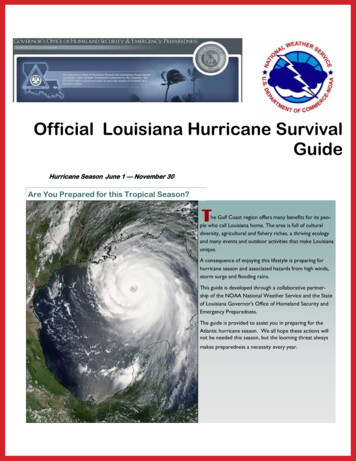
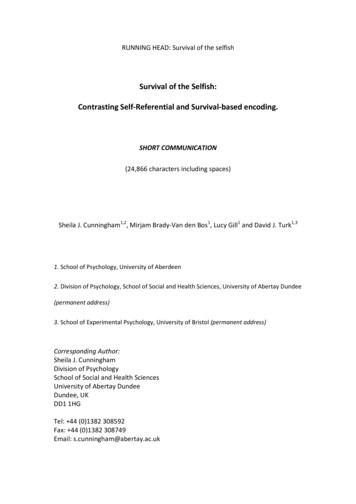
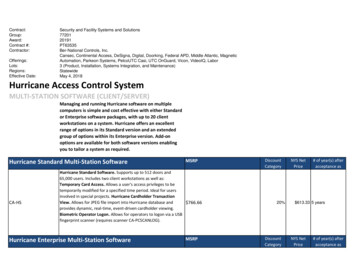
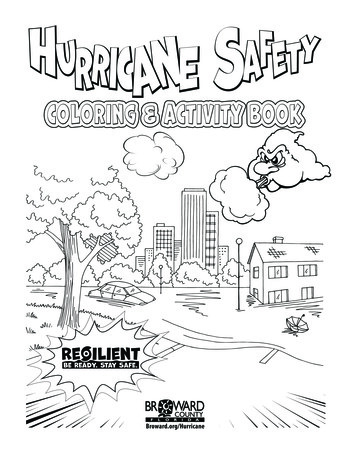
![[ST] Survival Analysis - Stata](/img/33/st.jpg)
